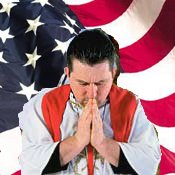Military Chaplains
One of us recently saw a soldier in an American military hospital in Iraq with severe burns on his face. An improvised explosive device detonated near the gas tank of a semi truck that he and a buddy were driving, taking off most of one of his legs and spraying burning gasoline everywhere.

His buddy gave him a shove strong enough to push him out of the cab before he himself bailed out. Both were on fire, both rolled to put out the flames. They eventually found one another and hugged and cried until help arrived.
That soldier in the ICU is forever grateful for his buddy’s shove — it saved his life. And just a few Fridays ago he was sitting in bed, wearing a Santa hat, combing through a binder of music CDs. He was looking for Christmas music so he could anticipate his return home.
As military chaplains, the four of us (and thousands of our colleagues) have been blessed with an extraordinary ministry that has placed us in the midst — and in the aftermath — of combat, and in the homes of American families anxious about their loved ones serving our country abroad. In the course of that work, we have witnessed many more acts of duty and devotion — and of grace and purpose — than we could possibly list here.
And we have also witnessed the incredible emotional and spiritual pressures that our service members and their families carry each and every day, especially around the holidays: the stress of combat, but also the intense strain of prolonged separation on families and on young marriages.
And yet, it has been in this context that many of our men and women in uniform make radical spiritual changes in their lives. Who are these defenders of our nation? They are the sons and daughters of your neighbors, co-workers, friends and relatives. They hail from cities, suburbs and rural areas. They are the MTV, BET, CMT, Xbox, PlayStation and Game Boy generation who are doing something that most Americans would never dare to do.
They rise early in the morning not knowing whether it will be their last day on earth. They work long hours in the hot sun and go on dangerous missions at all hours. But when the storms of life blow strongest, the roots of faith grow deepest.
Chapel service in Iraq is dirty, dusty and raw. There are no frills and thrills or glitter and gleam.
And yet we have seen the transformative power of real faith in the young men and women who come to worship with a Bible in one hand and an M-16 in the other. They pray with their eyes closed tightly, singing songs of praise from the bottom of their hearts and the depth of their souls.
Ours is a military ministry, and our flock, we believe, will never be the same. They will be deeper, more thoughtful, and more ready to make a difference when they return home — and so will we.
As chaplains, we do what we can to serve the spiritual and emotional needs of the military family, but you too can make a difference.
When the Department of Defense program “America Supports You” asked us to suggest how Americans here at home can best support our work, our first response was, naturally, “pray for the troops.” And we have witnessed, again and again, the power of your prayers to lift up the lives of those we serve.
But we have also seen the real difference prayer can make when combined with deeds, with your gestures of support. From writing letters to sending care packages, phone cards, and DVDs, we can’t understate the impact of some tangible sign from home, even from strangers, communicating respect, appreciation, and support.
You only have to go as far as the website http://www.americasupportsyou.mil/ which links to hundreds of grassroots organizations that undertake countless activities to support and to help our men and women in uniform.
In Iraq recently, one of us was distributing some of the goodies received in a care package from back home. Seeing a soldier looking particularly down prompted a stop, a goodie bag, and a chat. The young soldier didn’t know what to say. He had seen a number of people get multiple packages and he hadn’t received one. When told that this package came from a church back home, he almost began to tear up. He just managed to squeak out the fact that he was praying for God to send him a sign that He was really there, and then he saw one of us walk by. The relationship was never the same. He even made it to the worship service a couple of times. That’s a military ministry, or what we would call a “ministry of presence.”
But we can’t do it alone. Ministry is not a one-person job but a joint enterprise that should be embraced by those who walk in the faith.
And whatever the specifics of your own faith, we’d like to ask you to join in our ministry of support, this holiday season and every day of the year.
- Lieutenant Colonel Scott A. Ofsdahl and Captain James Key are chaplains in the Air Force and Army, respectively. They contributed to this piece from Iraq. Captain Tim Maracle and Lieutenant Michael Moreno are chaplains in the Army and the Navy, respectively. They recently returned from their tours in Iraq.

No comments:
Post a Comment